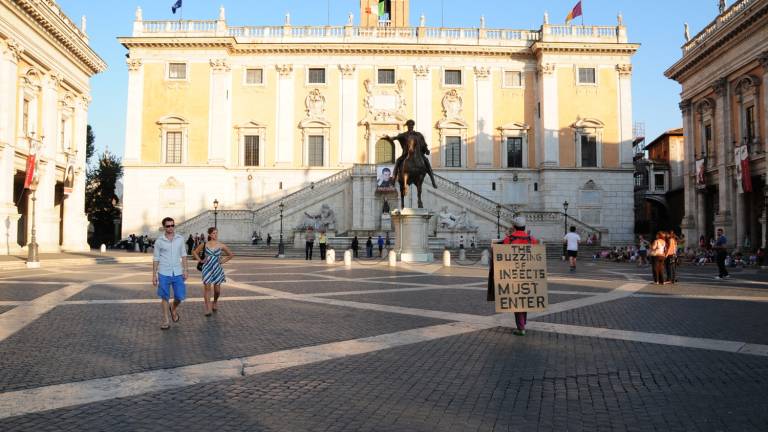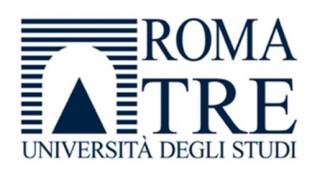Annual Multidisciplinary Conference Series: Established in 2023

Kreider + O’Leary, "Parrhesia", Campidoglio, Rome, Italy, September 2011
The environmental crisis is a planetary problem but the ways in which the climate catastrophe is experienced and spoken and written about are far from universal. Environmental slow violence unfolds globally but unevenly across self-perceived centres and peripheries of political, economic, and cultural power. It cements and exacerbates century-old patterns of colonial violence. The language of the Anthropocene foregrounds universality, in ways that risk to marginalise or silence the world’s most vulnerable communities.
How can we strive for a plurality of languages that articulates these tensions and apparent contradictions, and that aspires to transcend them? What are the most salient differences, across dominant and minority languages, including the languages of indigenous people? How is the global environmental catastrophe differently conceptualised in policy and science, on the one hand, and everyday life, on the other?
Established in 2023, this annual conference offers a comparative analysis and collective re-thinking of the role of language(s) in personal, communal, transnational and planetary engagement with environmental catastrophe. We focus on four interrelated sets of questions:
- How can the expertise of scholars of literature, language, and culture be engaged to advance our understanding of cultural and linguistic difference in climate discourse?
- How can researchers help foster multilingual communities that query Anthropocene discourse from diverse angles, including the position of its least privileged and most vulnerable designations?
- What is the relation between human multilingualism and more-than-human communities, temporalities, and intersections? Can multilingualism guide us towards imaginative frameworks that resist anthropocentric mastery?
- Can we read the Anthropocene as a grammar or language that is shaped by particular quotidian orderings of world-ending and world-building forces (e.g. time, movement, affect, space)?
Programme
- 2024 Symposium
Day 1: Tuesday, 18th June 2024
Location: Sala Ignazio Ambrogio | Dipartimento di Lingue, Letterature Culture Straniere
Università degli Studi Roma Tre | Via del Valco di San Paolo 19 |00142 Rome11:20 WELCOME
11:30 INTRODUCTIONs
Florian Mussgnug (University College London)
11:45 OPENING KEYNOTE
Anais Maurer (Rutgers University | CAPAS)
Fighting Nuclear Colonialism and Climate Imperialism from the Empire's Edge12:45 Lunch 14:15 AGAINST CLIMATE COLONIALITY
Chair: Lucia Esposito (Roma Tre University)
Cydney Phillip (University College London)
Liquid Plantationocene: Narratives of Water from the U.S. Gulf CoastEleonora Rossi (Birkbeck University London)
Flows of Change: Resistance in Contemporary Indigenous Australian Fiction15:45 Coffee 16:15 INHABITATION, ENTANGLEMENT, LANDSCAPE
Chair: Luca Marcozzi (Roma Tre University)
Felicitas Loest (Heidelberg University | CAPAS)
Troubling Coloniality: the Sublime and Haunting in Mexican Landscape PoetrySilvia Vittonatto (University College London)
Uomini e sterpi: Ecological Precarity and Plant-Human Entwinements17:45 CLOSING REMARKS (DAY ONE)
18:45 THE LANGUAGES OF WATER
"Moby Dick", Via Edgardo Ferrati, 3a, 00154 Roma (TBC)
Concept concert with Juliano Abramovay (fretless guitar), Chrysanthi Gkika (lyra), Stefano Nencha (guitar), Stefano Nunzi (bass), Alessandro Luccioli (percussion), Maddalena Pennacchia (voice).
DAY 2: Wednesday, 19th June 2024
Location: Sainsbury Lecture Theatre | British School at Rome | Via Antonio Gramsci 61 | 00197 Rome
09:00 Welcome 09:10 VOICES OF THE ANTHROPOCENE
Chair: Courtney Quaintance (British School at Rome)
Michael Dunn (Heidelberg University | CAPAS)
Singing Through the Slothocene: The Voice(s) of Apocalyptic ProphecyMaddalena Pennacchia (Roma Tre University)
and Juliano Abramovay (Durham University |Codarts University for the Arts)
Human Landscapes, Transcreation, and Music10:30 Coffee 10:50 CREATIVE-CRITICAL INTERVENTION
Caitríona Ní Dhúill (University of Salzburg)
Andiamo / Let's Get Out of Here: Kinetic Thinking and Radical Relocalisation11:30 NARRATIVES OF DIVERSITY AND DISSENT
Chair: Caterina Romeo (Sapienza University of Rome)
Robert Folger (Heidelberg University |CAPAS)
Cannibals: Indigenous Apocalypse and ColonialismSimona Corso (Roma Tre University)
Decolonial Indignation: Voices from the Caribbean13:00 Lunch 14:00 SPECULATIVE TEMPORALITIES
Chair: Emilia Di Rocco (Sapienza University of Rome)
Gero Bauer (University of Tübingen)
Facing the Present: Narrative and Critical Moods in Times of CrisisGiulia Magro (Sapienza University of Rome)
Future (Im)Perfect: Ecomedievalist Temporalities in Science FictionAbigail Bleach (University College London)
Out of Time: Nuclear Semiotics and the Medieval(ish) Anthropocene15:45 Coffee 16:15 CRITICAL INFRASTRUCTURES
Chair: Giuseppe Episcopo (Roma Tre University)
Birgit Neumann (Düsseldorf University)
"Neatly Dismantled" Infrastructures in Speculative Fiction:
The Pharmakon of the AnthropoceneRhys Williams (University of Glasgow)
Feeling Our Way Through: Imaginaries, Communities, and Infrastructures of Energy17:45 Break 18:00 PUBLIC KEYNOTE
Chair: Simona Corso
Shaul Bassi (Ca' Foscari University of Venice)
Othello in the Anthropocene19:30 Drinks 20:00 Conference dinner Day 3: Thursday, 20th June 2024
Location: Dipartimento di Studi Europei, Americani e Interculturali | Sapienza Università di Roma | Edificio Marco Polo | Viale dello Scalo San Lorenzo 82 | 00159 Rome
9:00 WELCOME
9:15 CARTOGRAPHIES OF THE (POST)MODERNIST ANTHROPOCENE
Chair: Iolanda Plescia (Sapienza University of Rome)
Florian Mussgnug (University College London | Roma Tre)
Unlearning the End of History: from Postmodernism to Early AnthropoceneAsia Battiloro (Sapienza University of Rome)
Ec[h]ologies of Modernism in Amy Sackville’s Polar Novel The Still PointAdam Stock (York St John University |CAPAS)
Colonial Cartographies and Apocalyptic Imaginaries: Deserts at the End of the World11:15 Lunch 11:45 GENRES OF THE (POST)MODERNIST ANTHROPOCENE
Chair: Ali Deharidad (Sapienza University Rome)
Rosanne Gallenne (University College Dublin)
Sheila Wingfield's Ecopoetry: Preserving Class or Preserving Nature?Annamaria Elia (Sapienza University of Rome)
Voices from the Elsewhere: Surrealism and Posthumanism in Antoine VolodineDaniel Finch-Race (University of Bologna)
Postmodern Currents in Beate Geissler and Oliver Sann’s How Does the World End (for Others)?13:30 Conclusions and lunch Day 3: Thursday, 20th June 2024
9:00 WELCOME
9:15 CARTOGRAPHIES OF THE (POST)MODERNIST ANTHROPOCENE
Chair: Iolanda Plescia (Sapienza University of Rome)
Florian Mussgnug (University College London | Roma Tre)
Unlearning the End of History: from Postmodernism to Early AnthropoceneAsia Battiloro (Sapienza University of Rome)
Ec[h]ologies of Modernism in Amy Sackville’s Polar Novel The Still PointAdam Stock (York St John University |CAPAS)
Colonial Cartographies and Apocalyptic Imaginaries: Deserts at the End of the World11:15 Lunch 11:45 GENRES OF THE (POST)MODERNIST ANTHROPOCENE
Chair: Ali Deharidad (Sapienza University Rome)
Rosanne Gallenne (University College Dublin)
Sheila Wingfield's Ecopoetry: Preserving Class or Preserving Nature?Annamaria Elia (Sapienza University of Rome)
Voices from the Elsewhere: Surrealism and Posthumanism in Antoine VolodineDaniel Finch-Race (University of Bologna)
Postmodern Currents in Beate Geissler and Oliver Sann’s How Does the World End (for Others)?13:30 Conclusions and lunch
- 2023 Symposium
Day 1: Tuesday, 20th June
14:00 INTRODUCTION
Florian Mussgnug (University College London)
Abigail Brundin (British School at Rome)
14:10 OPENING KEYNOTE
Mads Rosendahl Thomsen (Aarhus University)
Decentering and Transgressing: Two Modes of Posthumanist OrientationChair: Monika Kaup (University of Washington)
15:10 PANEL 1: ORIENTATIONS
Chair: Camilla Miglio (Sapienza University Rome)
Lara Choksey (University College London)
Signs of the Anthropocene: a vague poeticsMichael Dunn (Heidelberg University)
Pandora’s Music Box: Opening up the Apocalyptic Anthropocene16:30 Coffee break 17:15 PANEL 2: ASSEMBLAGES
Chair: Luca Marcozzi (Roma Tre University)
Lydia Gibson (Columbia University)
(data) Clouds in Untainted Skies above Brave New WorldsDaniel Finch-Race (University of Bologna)
Time for Trashscapes18:45 CLOSING REMARKS (DAY ONE)
Emilano Guaraldo (Ca’ Foscari University Venice)
Iolanda Plescia (Sapienza University Rome)DAY 2: Wednesday, 21 June 2023
09:00 PANEL 3: ECOLOGIES
Chair: Anne Brüske (Regensburg University)
Tommy Lynch (Chichester University)
Undoing the Anthro of the AnthropoceneFlurina Gradin (Zurich University of the Arts and St Gallen University)
Biotope Topologies: Sensing Unruly Natures and Hybrid EcologiesPieter Vermeulen (KU Leuven)
Talking Trees: Plant Communication and Other Fictions of Spontaneous Order11.00 Coffee Break 11:30 PANEL 4: NARRATIVES
Chair: Manfredi Merluzzi (Roma Tre University)
Giada Peterle (University of Padova)
Graphic Narrative and the Multiscalar Geographies of “Home”Robert Folger (Heidelberg University)
Anthropocenic Monolingualism? Epistemological Challenges13:00 Lunch Break 14:00 PANEL 5: GENRES
Chair: Anne Schwan (Edinburgh Napier University)
Florian Mussgnug (University College London)
Reading Climate Fiction as World LiteratureSilvia Vittonatto (University College London)
Resistant Grief and Futurity in the Contemporary Climate Change MemoirJenny Stümer (Heidelberg University)
Feels like an Impasse: The Anthropocene as Apocalyptic Genre16:00 Coffee 16:30 VIRTUAL KEYNOTE
Ursula K. Heise (University of California, Los Angeles)
Anthropocene MultiverseChair: Pieter Vermeulen (KU Leuven)
17:30 Break 18:00 PUBLIC KEYNOTE
Stephen Shapiro (University of Warwick)
Gramsci’s Anthropocene; or, Planning for the Post-ApocalypseChair: Florian Mussgnug
 Close
Close







